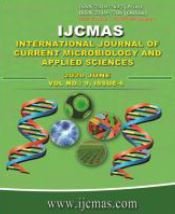


 National Academy of Agricultural Sciences (NAAS)
National Academy of Agricultural Sciences (NAAS)

|
PRINT ISSN : 2319-7692
Online ISSN : 2319-7706 Issues : 12 per year Publisher : Excellent Publishers Email : editorijcmas@gmail.com / submit@ijcmas.com Editor-in-chief: Dr.M.Prakash Index Copernicus ICV 2018: 95.39 NAAS RATING 2020: 5.38 |
Epigenetics is the study of heritable changes in gene expression and other genomic functions without altering the underlying DNA sequence. It is associated with gene expression and the expression of different phenotypes mainly by a level of genetic regulation which is independent of the DNA sequence and transmitted somatically or inherited through modification of DNA regions and allows organisms on a multi-generational scale to switch between phenotypes. Gene expression due to epigenetics is mainly due to internal and external environmental effects present around an organism and these changes play a role in short-term adaptation of individuals and include reversibility. DNA methylation, chromatin remodelling and modifications through non coding RNA (ncRNA) are the main mechanisms involved in epigenetics. It plays a role in animal breeding as it helps in finding part of the missing causality and missing heritability of complex traits and diseases. Epigenetic factors respond answers to external or internal environmental cues like nutrition, pathogens, and climate, and have the power to vary gene expression resulting in emergence of specific phenotypes and it has a potential benefits in overall animal growth, production and reproduction.
 |
 |
 |
 |
 |